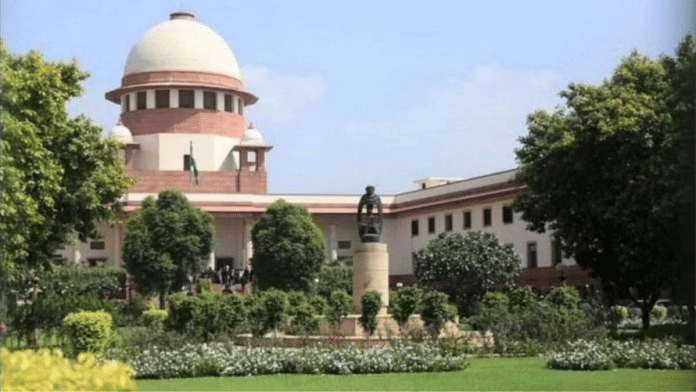Thank you dear subscribers, we are overwhelmed with your response.
Your Turn is a unique section from ThePrint featuring points of view from its subscribers. If you are a subscriber, have a point of view, please send it to us. If not, do subscribe here: https://theprint.in/subscribe/
‘In the court of justice, both the parties know the truth, it is the judge who is on trial.’ The golden quote taken from Justice J.R. Midha’s farewell speech explains the substantial burden on Indian judges. They are subjected to trial every day in every case. Their every statement, observation and decision is thoroughly scrutinized by almost all quarters of the society. But ultimately that enhances the credibility of the judiciary, and produces its image as a ‘beacon of hope’ in the eyes of people.
Over the years several judges and their judgements have crafted this image. This has helped in inducing a confidence in common citizens that they are equal in the eyes of the judiciary. That they are supposed to be treated in the same manner irrespective of their caste, class, region or profession, has made India’s judiciary- an Indian judiciary in true sense.
With that said, it is essential to scrutinize the Supreme Court’s recent order on granting interim bail to Delhi CM Arvind Kejriwal in Delhi excise policy case.
Rejecting the Enforcement Directorate’s arguments of bringing farmers, businesspersons and Mr. Kejriwal on the same page, the court said, “While examining the question of grant of interim bail/release, the court always takes into consideration the peculiarities associated with the person in question and the surrounding circumstances.”
But the court failed to explain the ‘normative’ procedures applied while considering the peculiarities associated with Mr. Kejriwal. From politicians like Manish Sisodia, K Kavitha and Hemant Soren to a number of businesspersons accused under Prevention of Money Laundering Act (PMLA) have been denied bail on the basis of stringent bail conditions under Section 45 of PMLA. Even the surrounding circumstances of ‘elections’ wasn’t taken into consideration while hearing the bail plea of Mukhtar Ansari, where the High Court pointed out that the legal right of a candidate to contest an election doesn’t translate into a legal right to canvass for his candidature.
In the present case, the court left it to the discretion of the people to guess how the ‘surrounding circumstances’ of 2024 general elections matter more to Arvind Kejriwal than his fellow politicians. Is it because of the ‘popular opinion’ that Kejriwal’s capacity to capture media attention and gain visibility in mainstream media is comparatively more? Of course it can’t be the case. What is it then?
The ‘arbitrariness’ involved in any executive action or judicial decision is detrimental to the idea of equality. When the ‘substance’ of any case is subsided by the ‘popular culture’, the concept of equality will definitely get hurt. The idea of ‘constitutional conscience’ can only be legitimized when it is based on ‘pure normative principles’ devoid of any arbitrariness.
The court itself has criticized the arbitrariness in executive actions on a number of occasions. In E.P. Royappa v. State of Tamil Nadu, the court said, “The right to equality is against arbitrariness. They both are enemies to each other.” In one of the judgements Justice Subba Rao held, “… it is important to emphasize that the absence of arbitrary power is the first essential of the rule of law upon which our whole constitutional system is based.” If the arbitrariness in executive actions is wrong, it is equally or even more wrong in judicial verdicts.
It is the responsibility of the judiciary to ensure that democracy works properly. But it is only a democratic judiciary that can fulfill this responsibility in the right sense. The judges should be mindful of the fact that the credibility of India’s judiciary is not based on any single judgment. It comes from the procedural integrity that the courts have developed over a long period of time. It is essential to continuously strengthen this.
In the present case, countering the ED’s argument of comparing Arvind Kejriwal’s issue with farmers harvesting, the court pointed out that ‘if an accused farmer misses a harvest, it is not irreversible as he can prepare for the next harvest. However, general elections belong to a different category as a rival party may suffer an irreversible setback.’ This is in complete contrast to the idea of equality enshrined in the constitution, where the judges themselves, on the basis of popular presumptions, are upholding the hierarchical order of different professions. This is simply injudicious.
The judges should remind themselves of the fact that it is not any politician or a political party that rules over the country. It is the laws passed by the parliament and the rules framed under those laws that rule.
With that said, the clouds of arbitrariness, while considering the peculiarities associated with Arvind Kejriwal and the surrounding circumstances of 2024 general elections should be cleared. And for that to happen, the court must prescribe a procedure for itself, which must be liable to be tested with reference to Article 14, as it itself laid for state actions in the Maneka Gandhi case.
These pieces are being published as they have been received – they have not been edited/fact-checked by ThePrint.


